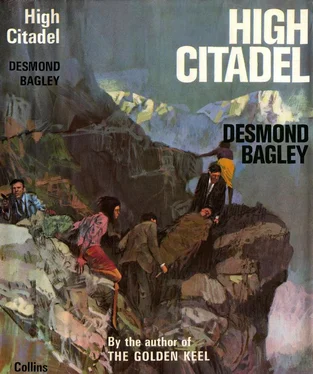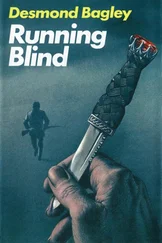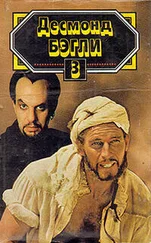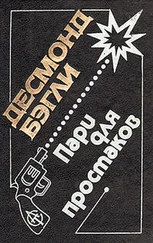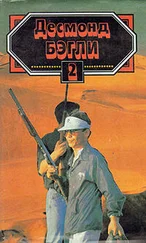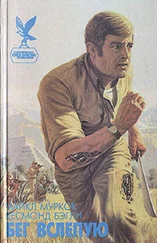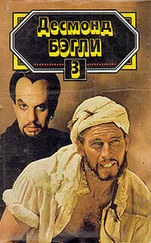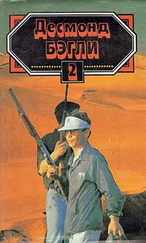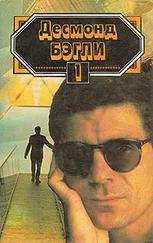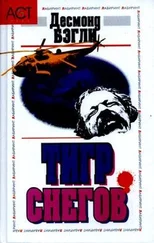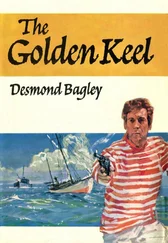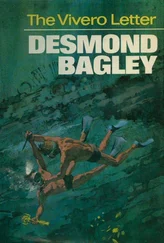Sueguerra clapped him on the back. ‘We do not need you — what is one extra man? And in any case we do not want a norteamericano involved. This is a home-grown revolution. But there may be some patching-up for you to do when this is over.’
But there was little fighting at the post office. The attack was so unexpected and in such overwhelming strength that the Eighth Squadron detachment put up almost no resistance at all, and the only casualty was a corporal who got a bullet in his leg because an inexperienced and enthusiastic amateur rifleman had left off his safety-catch.
Sueguerra strode into the post office. ‘Jaime! Jaime! Where is that fool of an electrician? Jaime!’
‘I’m here,’ said Jaime, and came forward carrying a large box under his arm. Sueguerra took him into the main switch-room and McGruder followed.
‘It’s the third bank of switches — fifteenth from the right and nineteenth from the bottom,’ said Sueguerra, consulting a scrap of paper.
Jaime counted carefully. ‘That’s it,’ he said. ‘Those two screw connections there.’ He produced a screwdriver. ‘I’ll be about two minutes.’
As he worked a plane screamed over the town and then another and another. ‘I hope we’re not too late,’ whispered Sueguerra.
McGruder put his hand on his arm. ‘What about Forester and Rohde?’ he said in alarm. ‘They are at the airfield.’
‘We do not destroy hospitals,’ said Sueguerra. ‘Only the important installations are mined — the fuel and ammunition dumps, the hangars, the runways, the control tower. We only want to immobilize them — they are Cordillerans, you know.’
Jaime said, ‘Ready,’ and Sueguerra lifted the plunger.
‘It must be done,’ he said, and abruptly pushed down hard.
It seemed that Coello was leading the strike because the next time he entered the office he was in full flying kit, parachute pack and all. He looked sour. ‘You have gained yourself more time, Forester. The decision on you will have to wait. I have other, more urgent, matters to attend to. However, I have something to show you — an educative demonstration.’ He snapped his fingers and two soldiers entered and picked up the stretcher.
‘What sort of a demonstration?’ asked Forester as he was carried out.
‘A demonstration of the dangers of lacking patriotism,’ answered Coello, smiling. ‘Something you may be accused of by your government one day, Mr Forester.’
Forester lay limply on the stretcher as it was carried out of the building and wondered what the hell was going on. The bearers veered across the apron in front of the control tower, past the single Sabre fighter, and Coello called to a mechanic, ‘ Diez momentos ’. The man saluted, and Forester thought, Ten minutes? Whatever it is, it won’t take long.
He turned his head as he heard the whine of an aircraft taking off and saw a Sabre clearing the ground, its wheels retracting. Then there was another, and then the third. They disappeared over the horizon and he wondered where they were going — certainly in the wrong direction if they intended to strafe O’Hara.
The small party approached one of the hangars. The big sliding doors were closed and Coello opened the wicket door and went inside, the stretcher-bearers following. There were no aircraft in the hangar and their footfalls echoed hollowly in dull clangour from the metal walls. Coello went into a side room, waddling awkwardly in his flying gear, and motioned for the stretcher to be brought in. He saw the stretcher placed across two chairs, then told the soldiers to wait outside.
Forester looked up at him. ‘What the hell is this?’ he demanded.
‘You will see,’ said Coello calmly, and switched on the light. He went to the window and drew a cord and the curtains came across. ‘Now then,’ he said, and crossed the room to draw another cord and curtains parted on an internal window looking into the hangar. ‘The demonstration will begin almost immediately,’ he said, and cocked his head on one side as though listening for something.
Forester heard it too, and looked up. It was the banshee howl of a diving jet plane, growing louder and louder until it threatened to shatter the eardrums. With a shriek the plane passed over the hangar and Forester reckoned with professional interest that it could not have cleared the hangar roof by many feet.
‘We begin,’ said Coello, and indicated the hangar.
Almost as though the diving plane had been a signal, a file of soldiers marched into the hangar and stood in a line, an officer barking at them until they trimmed the rank. Each man carried a rifle at the slope and Forester began to have a prickly foreknowledge of what was to come.
He looked at Coello coldly and began to speak but the howling racket of another diving plane drowned his words. When the plane had gone he turned and saw with rage in his heart that Rohde was being dragged in.
He could not walk and two soldiers were half dragging, half carrying him, his feet trailing on the concrete floor. Coello tapped on the window with a pencil and the soldiers brought Rohde forward. His face was dreadfully battered, both eyes were turning black and he had bruised cheeks. But his eyes were open and he regarded Forester with a lacklustre expression and opened his mouth and said a few words which Forester could not hear. He had some teeth missing.
‘You’ve beaten him up, you bastard,’ exploded Forester.
Coello laughed. ‘The man is a Cordilleran national, a traitor to his country, a conspirator against his lawful government. What do you do with traitors in the United States, Forester?’
‘You hypocritical son-of-a-bitch,’ said Forester with heat. ‘What else are you doing but subverting the government?’
Coello grinned. ‘That is different; I have not been caught. Besides, I regard myself as being on the right side — the stronger side is always right, is it not? We will crush all these puling, whining liberals like Miguel Rohde and Aguillar.’ He bared his teeth. ‘In fact, we will crush Rohde now — and Aguillar in not more than forty-five minutes.’
He waved to the officer in the hangar and the soldiers began to drag Rohde away. Forester began to curse Coello, but his words were destroyed in the quivering air as another plane dived on the hangar. He looked after the pitiful figure of Rohde and waited until it was quiet, then he said, ‘Why are you doing this?’
‘Perhaps to teach you a lesson,’ said Coello lightly. ‘Let this be a warning — if you cross us, this can happen to you.’
‘But you’re not too certain of your squadron, are you?’ said Forester. ‘You’re going to shoot Rohde and your military vanity makes you relish a firing-squad, but you can’t afford a public execution — the men of the squadron might not stand for it. I’m right, aren’t I?’
Coello gestured irritably. ‘Leave these mental probings to your bourgeois psychoanalysts.’
‘And you’ve laid on a lot of noise to drown the shots,’ persisted Forester as he heard another plane begin its dive.
Coello said something which was lost in the roar and Forester looked at him in horror. He did not know what to do. He could shoot Coello, but that would not help Rohde; there were more than a dozen armed men outside, and some were watching through the window. Coello laughed silently and pointed. When Forester could hear what he was saying, he shuddered. ‘The poor fool cannot stand, he will be shot sitting down.’
‘God damn you,’ groaned out Forester. ‘God damn your lousy soul to hell.’
A soldier had brought up an ordinary kitchen chair which he placed against the wall, and Rohde was dragged to it and seated, his stiff leg sticking out grotesquely in front of him. A noose of rope was tossed over his head and he was bound to the chair. The soldiers left him and the officer barked out a command. The firing-squad lifted their rifles as one man and aimed, and the officer lifted his arm in the air.
Читать дальше
Конец ознакомительного отрывка
Купить книгу
